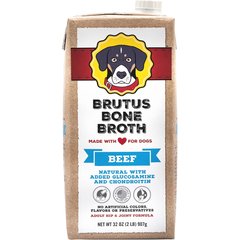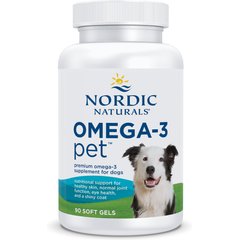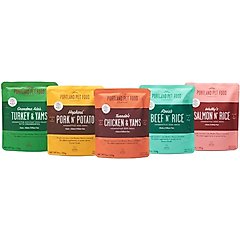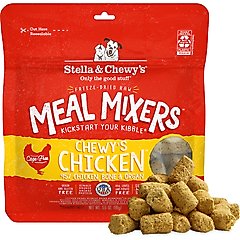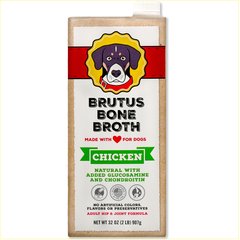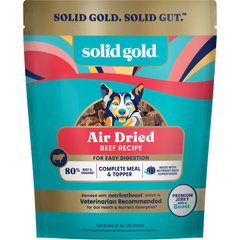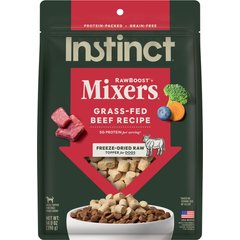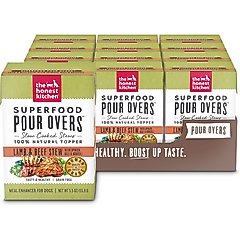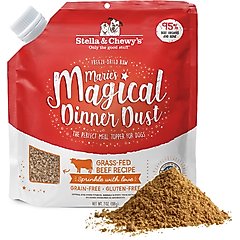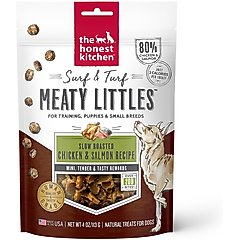The Ultimate Guide to Dog Food Toppers
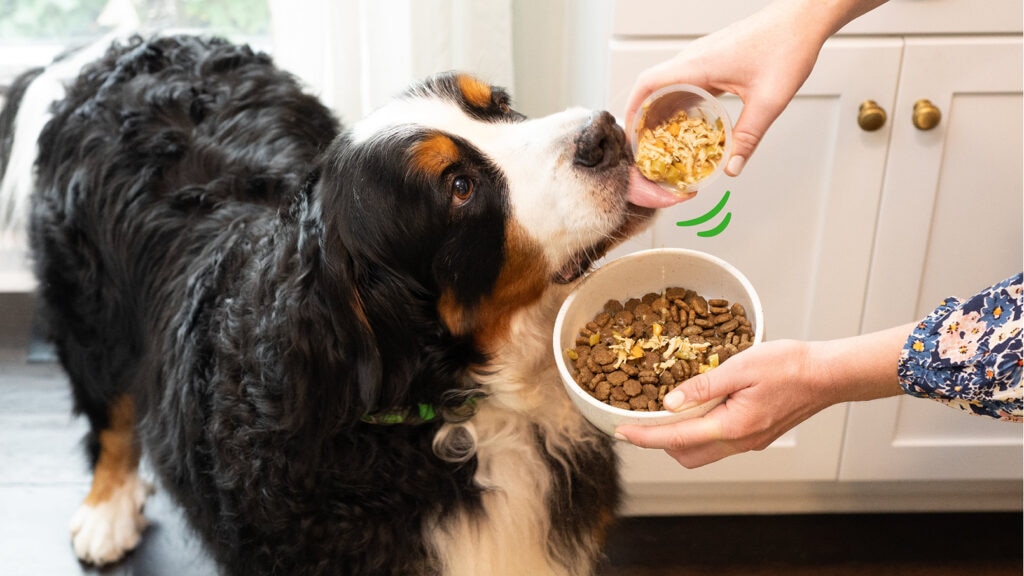
Photo by Chewy
Most dogs thrive when they eat a fairly consistent diet. Once you find a dog food that works well for your pooch, there’s no real reason to change.
But that doesn’t mean you can’t provide your dog with a little variety! Dog food toppers are the perfect way to spice up your dog’s diet without making any major changes.
Speak with your veterinarian before changing your dog’s diet.
What Are Dog Food Toppers?
Dog food toppers are flavorful additions to meals that can enhance taste, texture, and nutrition. They are designed to be added to—not replace—a complete and balanced dog food. They come in many different forms.
| Type | Description | Great For |
|---|---|---|
| Fresh dog food toppers | Gently cooked meats or vegetables | Picky eaters or dogs who need a boost in moisture |
| Freeze-dried dog food toppers | Shelf-stable, often raw | Pet parents seeking high protein and convenience |
| Broth-based toppers | Hydrating and tasty | Dogs who appreciate a softer, soaked kibble |
| Air-dried dog food toppers | Gently dried at moderate temperatures to maintain nutrition, shelf-stable | Dogs who like chewy texture |
| Homemade dog food toppers | Control over ingredients | Pet parents who like to cook for their dog without having complete responsibility for all nutrition |
| Raw dog food toppers | Can be an easy way to add some raw ingredients; risks of feeding raw dog food still apply | No dogs, as they’re not recommended by vets |
| Wet dog food toppers | Hydrating and tasty; canned dog food can be used as a topper that provides complete and balanced nutrition | Pet parents who don't want to choose between wet or dry food |
| Powder dog food toppers | Convenient way to boost flavor and often protein; can easily have several options on hand | Dogs who like variety |
| Dog treats | Mix small amounts of your dog’s favorite treats into their food—but use sparingly | Pet parents in a pinch |
| Healthy human foods | Can be easily tailored; avoid human foods that can be dangerous for dogs | Dogs who have specific tastes |
What Are the Benefits of Dog Food Toppers?
While dog food toppers aren’t a necessary part of a dog’s diet, they can offer some real benefits.
Enhance Flavor and Texture
Toppers like Get Real fresh dog food make meals more appealing, especially for picky eaters or dogs who are losing interest in their regular food.
Add Moisture To Dry Kibble
Toppers like broth or wet food can help keep your dog hydrated and make their meals more desirable and easier to chew.
Recommended Products
Supplement Nutrients in the Diet
Many toppers are high in protein or can add other potentially beneficial nutrients (glucosamine, probiotics, or omega-3 fatty acids, such as Nordic Naturals).
Recommended Product
What Are the Risks of Dog Food Toppers?
Like all good things, toppers for dog food can have potential downsides.
Unbalanced Nutrition
Toppers that aren’t formulated to provide complete and balanced nutrition could throw off your dog’s nutrient ratios. Limit treats of all sorts, including toppers, to 10% of your dog’s daily total caloric intake.
It’s also worth noting that once your dog becomes accustomed to eating their meals with a food topper, it can be difficult to wean them off and they may refuse to eat food without a topper in the future.
Weight Gain
Adding toppers without adjusting other sources of calories can lead to weight gain. If toppers add 30 calories to your dog’s diet, reduce their intake elsewhere by 30 calories.
Stomach Upset
Adding anything new to a dog’s diet can lead to an upset stomach. To help prevent this, gradually introduce new foods.
Should you opt for raw food toppers, be extra cautious. Several studies have shown that raw and undercooked pet food products can contain pathogens, including salmonella and listeria bacteria.
Do Vets Recommend Dog Food Toppers?
Dog food toppers aren’t necessary if a healthy dog is eating appropriate amounts of a high-quality dog food, but vets do recommend them under certain circumstances, including:
- Getting picky eaters to eat more
- Adding moisture to the diet for dogs who are at risk for dehydration, such as those with chronic kidney disease
- Providing nutritional supplementation
What Are the Best Dog Food Toppers?
When purchasing a dog food topper, look for healthy options that improve rather than detract from your dog’s diet.
What To Look For in a Dog Food Topper
Every dog is different, so the best dog food toppers for one may not work well for another. With that said, good dog food toppers should:
Vet-Recommended Dog Food Toppers
- Fresh dog food topper: Portland Pet Food Company Homestyle Variety Pack Wet Dog Food Topper
Recommended Product
- Freeze-dried dog food topper: Stella & Chewy’s Chewy’s Chicken Meal Mixers Freeze-Dried Raw Dog Food Topper
Recommended Product
- Broth-based topper: Brutus Broth Chicken Bone Broth Hip & Joint with Glucosamine Dog Food Topper
Recommended Product
- Air-dried dog food topper: Solid Gold Complete & Balanced Beef Recipe Air Dried Dog Food Topper
Recommended Product
- Raw dog food topper: Instinct Raw Boost Mixers Beef Recipe Grain-Free Freeze-Dried Dog Food Topper
Recommended Product
Recommended Product
- Powder dog food topper: Stella & Chewy’s Marie’s Magical Dinner Freeze-Dried Raw Dust Grass-Fed Beef Dog Food Topper
Recommended Product
Recommended Product
- Homemade dog food topper: Such as mashed sweet potatoes or a veggie-studded beef stew
- Healthy human food: From apples to zucchinis
Should I Add Dog Food Toppers to My Dog’s Food?
Some dogs can benefit from food toppers, but in other cases, they aren’t necessary or could even be harmful. It’s always best to talk to your veterinarian before changing your dog’s diet.
FAQs About Dog Food Toppers
Q: Can puppies have dog food toppers?
A: Some types of dog food toppers (raw, for example) can be dangerous for puppies. Talk to your veterinarian before adding a puppy food topper to your dog’s diet.
Q: What dog food toppers can I give my puppy?
A: Wet puppy foods are a safe dog food topper for puppies. Mixing some nutritionally complete and balanced wet puppy food with your pup’s kibble is a good way to boost flavor and interest without compromising nutrition.
Q: What are the best dog food toppers for picky eaters?
A: Wet or fresh dog food toppers that have a strong odor are good options for picky dogs. Thoroughly mix the topper in with your dog’s regular food so they get the benefits of both.
Q: Can I give my dog homemade dog food toppers?
A: A small amount of homemade dog food can be a good topper as long as it doesn’t contain any toxic ingredients to dogs and is prepared safely.

